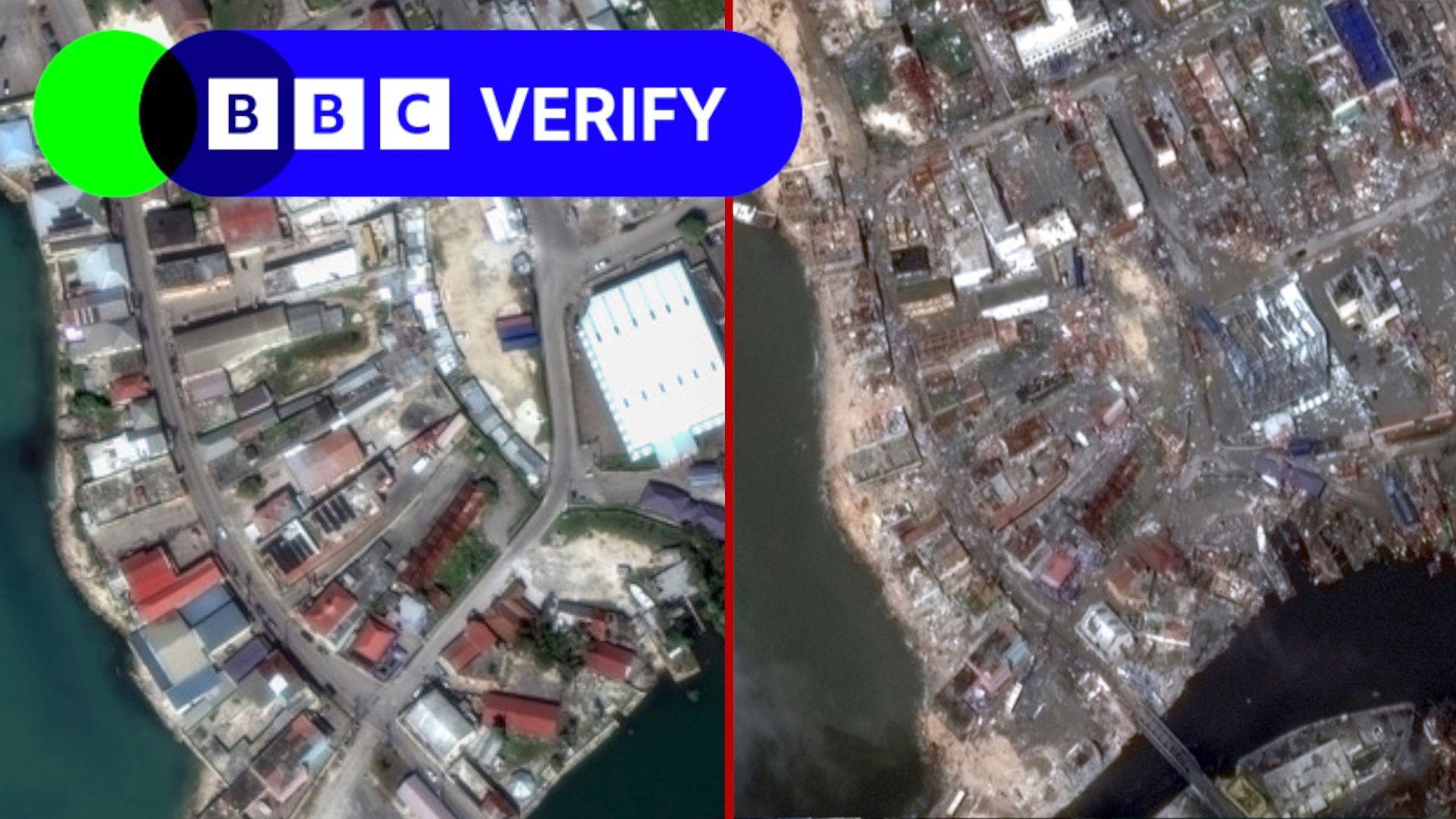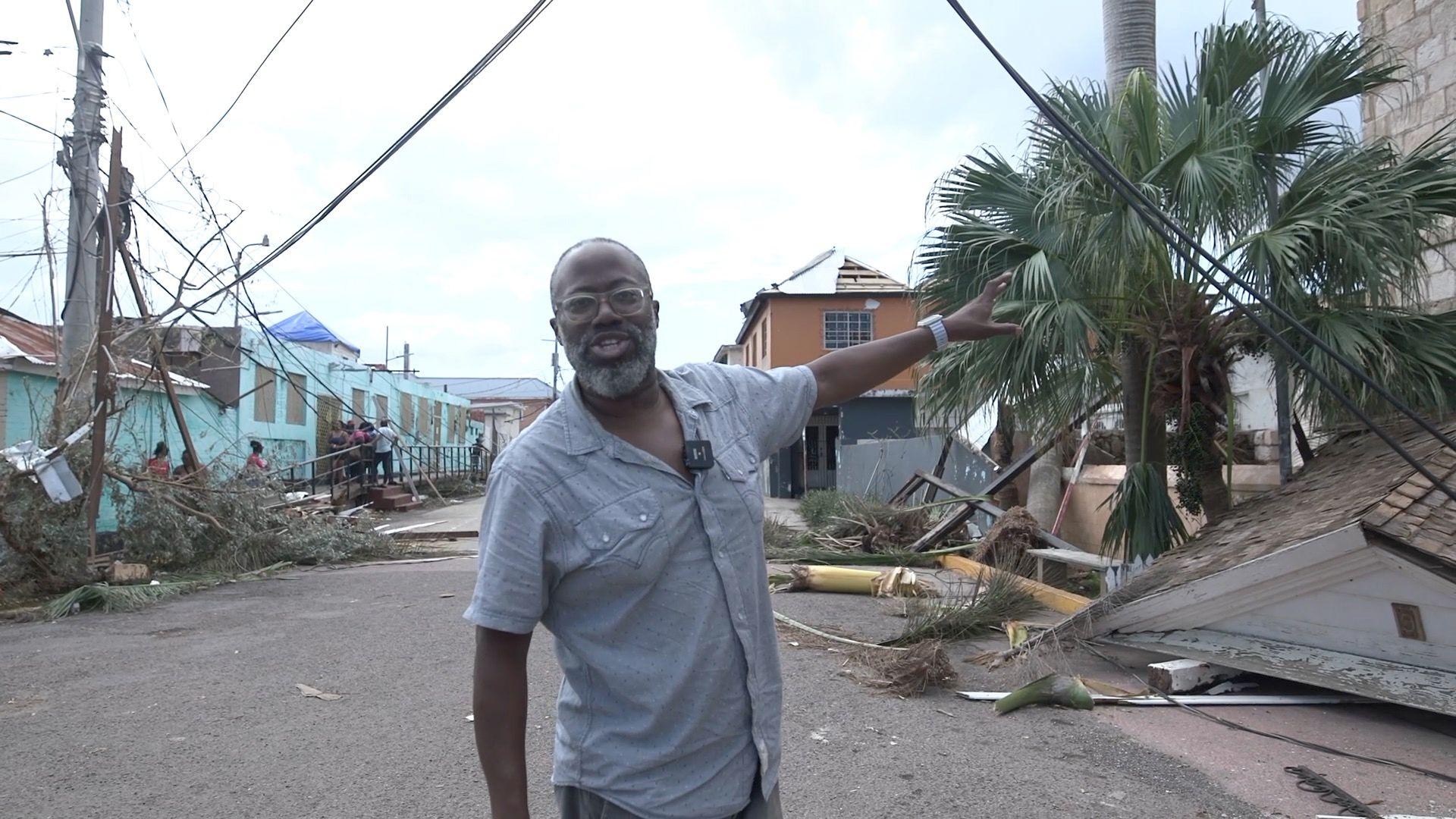Hurricane death toll rises as Jamaica aid effort struggles
Watch: BBC reports from "ground zero" of Hurricane Melissa's destruction
- Published
At least 19 people have died in Jamaica as a result of Hurricane Melissa, Information Minister Dana Morris Dixon says, as search and rescue efforts continue and authorities try to get aid to hard-hit areas.
The hurricane, one of the most powerful to strike the Caribbean, also killed at least 30 people in Haiti, officials say.
In Jamaica, "there are entire communities that seem to be marooned and areas that seem to be flattened", Dixon said, with "devastating" scenes in western regions.
Electricity remains out to most of the island and as people try to salvage damaged homes and belongings from flood water and mud, many thousands are growing increasingly desperate for aid.
Parts of the country have been without water for several days and food is growing increasingly scarce.
Aid supplies are starting to arrive more rapidly with the main airport in the Jamaican capital, Kingston, largely back to normal, but smaller regional airports, some of which are located near to where humanitarian assistance is most needed, remain only partly operational.
Aid agencies and the military are bringing in the urgently needed supplies from Kingston by land but many roads remain unpassable in places.
Watch: Before and after footage shows the destruction Hurricane Melissa caused to St John's Anglican church, a 300-year-old church
A journey from Mandeville, in the centre of the country, to Black River - normally an hour - is taking eight hours because the roads are so torn up.
Army vehicles and relief convoys are struggling to get past fallen trees and poles, leaving many who live in western areas very much without the aid they need.
On the drive towards Black River, the BBC saw devastating scenes that repeated throughout the country. Chunks of road were missing. Men in flip flops worked on the roofs of boarded houses, patching up missing shingles or nailing down sheets of zinc.
One woman, Olivia Cream, who lost her house by the beach in Black River, told BBC she was sheltering in a neighbour's attic when the hurricane hit. The roof ripped off while they were in the attic, leaving them totally exposed.
"We watched everything come apart around us, we watched 30ft waves come in and throw everything into the sea," Cream said.
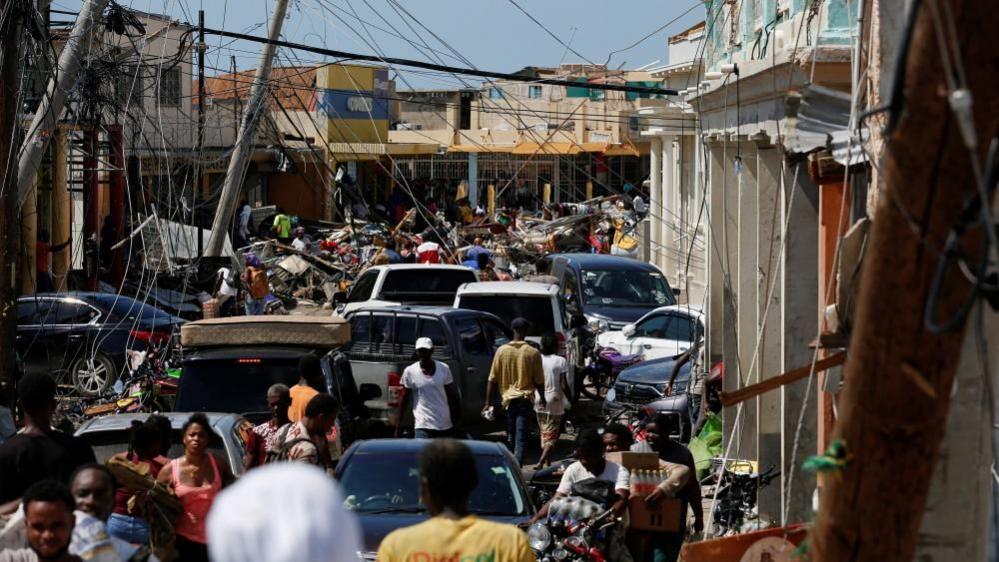
The roads in Black River, western Jamaica, are heavily damaged and overcrowded
When Cream returned to her own house, she saw that everything was gone - one kitchen cabinet remained intact, and luckily it had some food in it, she said.
"There are whole families living on the streets, with infants," Cream said of her town. "We are trying to get them food. The area looks like Hiroshima, it looks like the Gaza Strip."
In Santa Cruz, the hum of running generators filled the air, as did the smells of gasoline, diesel exhaust and fresh mud. Everything was mud-soaked - walls, floors, people. Random coconuts were scattered across an empty lot and store owners swept water out of buildings.
Hurricane Melissa: The Storm That Hit Jamaica
One of the most intense Atlantic hurricanes on record made landfall in Jamaica with 185mph winds. Category 5 Hurricane Melissa left a trail of destruction as it ripped through the Caribbean.
Watch now on BBC iPlayer
Barrington Robinson carried a long muddied machete over his shoulder as he stopped to talk in the parking lot, next to a grocery store where he works as a janitor. He was only able to reach this part of town by chopping through broken branches in his neighbourhood.
"Every place flooded out," he said. "Me uncomfortable. Me don't know what to do."
Satellite imagery shows nearly all buildings in some Jamaican villages have been destroyed by the hurricane.
Residents of towns in western Jamaica told the BBC on Thursday that "words can't explain how devastating" the storm has been for the country.
"No-one is able to get through to their loved ones," Trevor 'Zyanigh' Whyte told the BBC from the town of White House in Westmoreland parish.
"Everyone is just, you know, completely disconnected... Every tree is on the road, right, so you can't get too far with the cars, not even a bicycle," he said.
On the drive from Kingston to Falmouth towards Montego Bay, the scene worsens. Walking around, there are buildings with half a roof and people drying their mattresses by the sides of the road.
People are struggling to get their lives back together and trying to clear the streets, as the power company is trying to get poles moved.
Jamaica, a very green and mountainous country, has been stripped - leaving what looks like twigs and matchsticks.
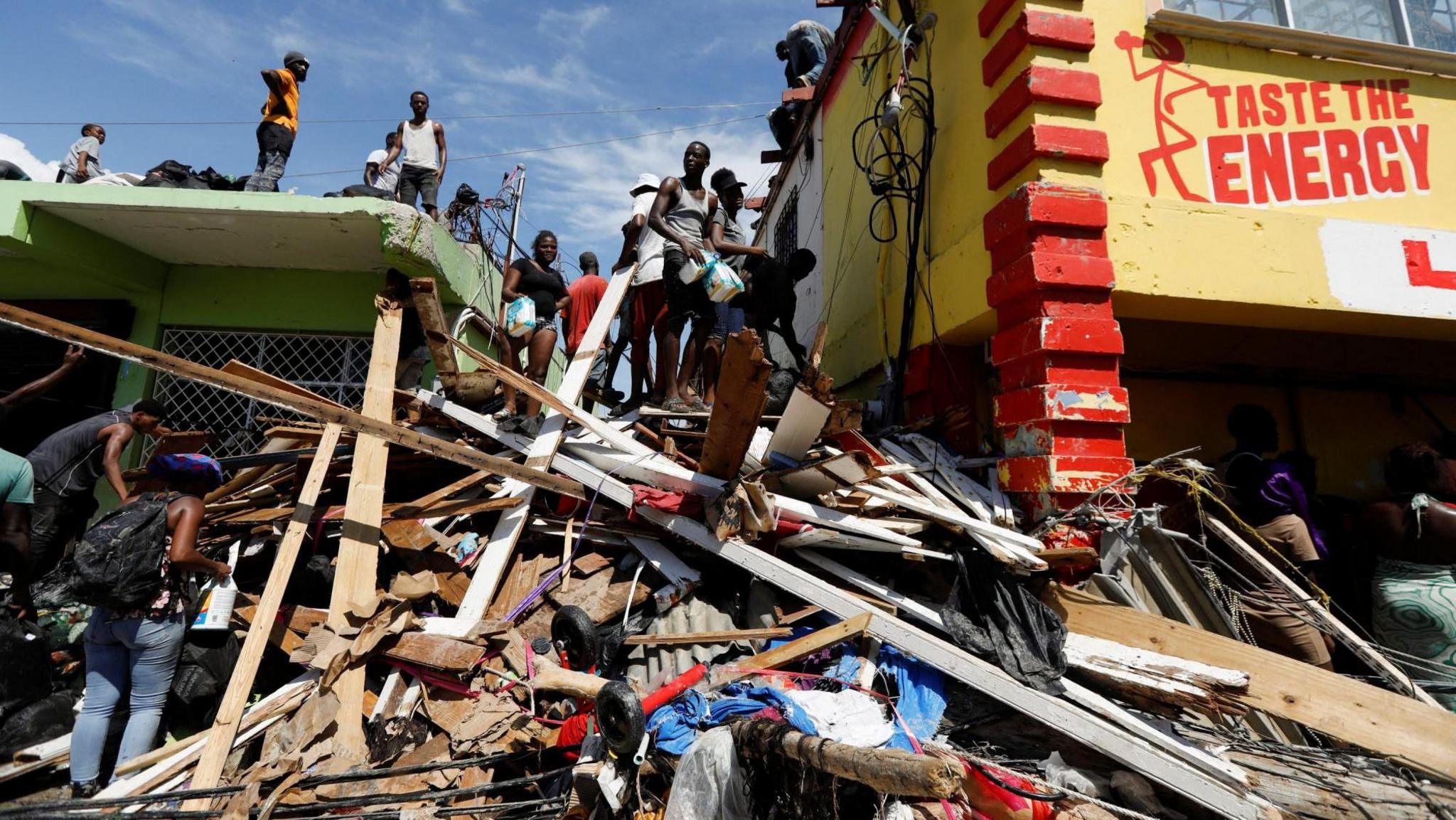
In Haiti, many of the victims in the storm died when a river overflowed in Petit-Goave. A full assessment is ongoing, as there are still areas that authorities have not been able to access.
Around 15,000 people were staying in more than 120 shelters in Haiti, interim UN co-ordinator for the country Gregoire Goodstein said.
In Cuba, more than 3 million people were "exposed to life-threatening conditions" during the hurricane, with 735,000 people "safely evacuated", according to the UN's resident co-ordinator for Cuba Francisco Pichon.
No fatalities have been reported so far in Cuba, but almost 240 communities have been cut off due to flooding and landslides, Cuban authorities said.
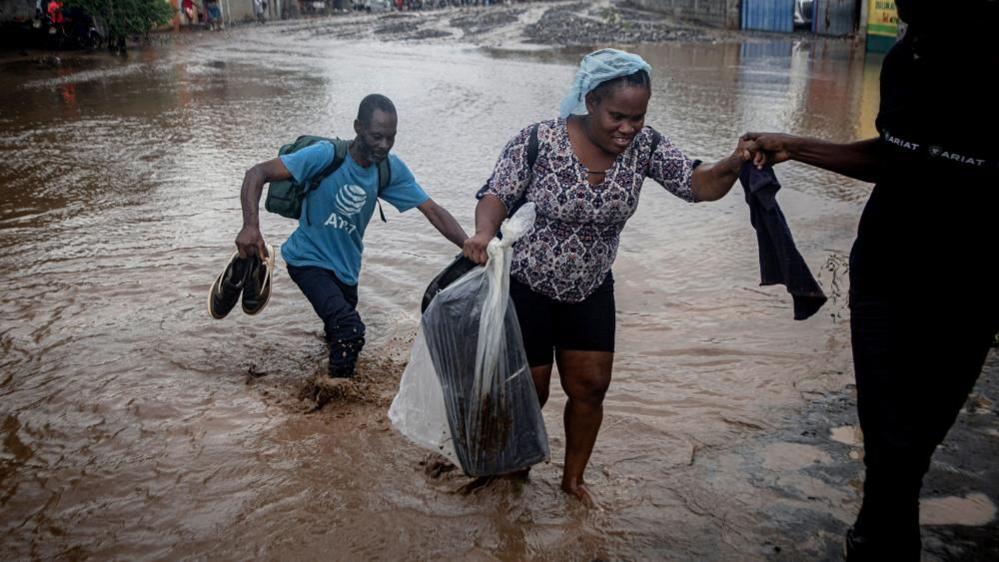
The hurricane killed at least 30 people in Haiti
Hurricane Melissa made landfall on Tuesday in Jamaica as a category five storm, packing winds of up to 185 mph (295 km/h), before impacting other countries in the Caribbean.
Governments, humanitarian organisations and individuals around the world are pledging support for the nations hardest hit by the storm.
The World Food Programme said it is collaborating with partners to coordinate logistics, cash and emergency supplies across Jamaica, Cuba, Haiti and the Dominican Republic.
The US State Department said it is deploying a disaster response team to the region to help with search and rescue operations, and assisting in efforts to provide food, water, medical supplies, hygiene kits and temporary shelters.
The UK government on Friday said it is mobilising an additional £5m ($6m) to send humanitarian supplies, including shelter kits and solar powered lanterns, to help people without power and whose homes have been damaged.
That is on top of £2.5m ($3.36m) already announced in emergency humanitarian funding to support recovery in the Caribbean.
The Foreign Office is also preparing flights to evacuate British nationals unable to come home on commercial flights.
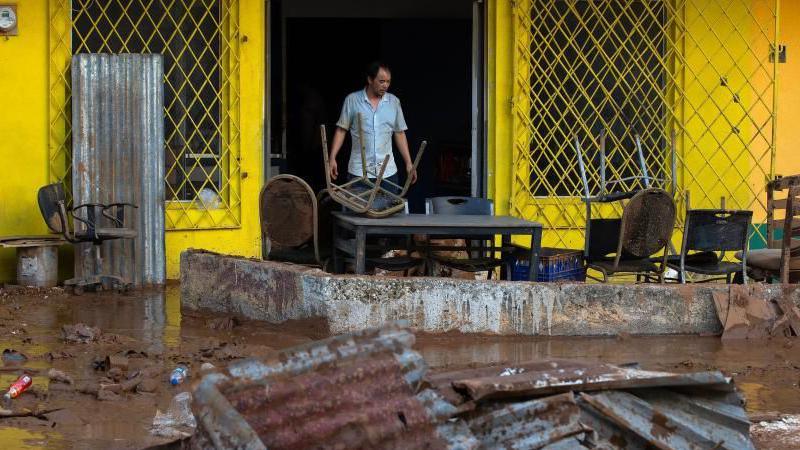
Jamaica is blighted by mud filled streets
While Jamaica, Cuba and Haiti assessed the damage left in Melissa's wake, Bermuda braced for impact.
The Bermuda Weather Service expected Melissa to be a category two hurricane when it passed the British overseas territory on Thursday night.
Government offices in Bermuda will close until Friday afternoon and all schools will shut on Friday.
"Until the official 'All Clear' is issued, residents are urged to stay off the roads so Government work crews can safely assess and clear debris," a public alert from the government said.
Additional reporting by Gabriela Pomeroy
If you experienced the hurricane in Jamaica, please share your story.
Get in touch
Are you in Jamaica or have loved ones on the island? Get in touch.
Hurricane Melissa: The Storm That Hit Jamaica
One of the most intense Atlantic hurricanes on record causes destruction in the Caribbean.
- Published30 October
